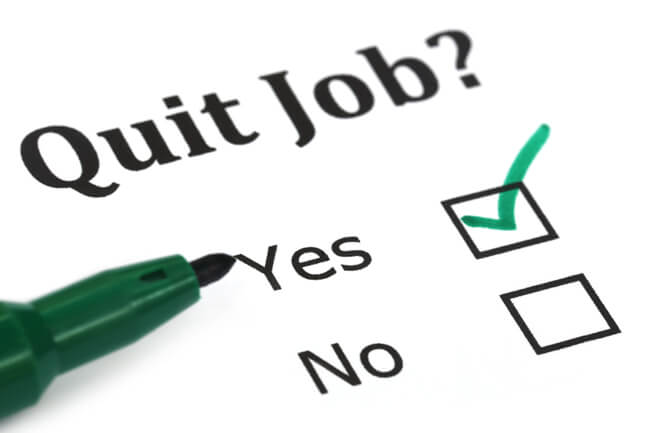Should I Quit My Job?
The Great Resignation, a term coined by organizational psychologist, Dr. Anthony Klotz, characterizes the trend in which large numbers of employees have quit their jobs from Spring of 2021 to the present. It’s believed that the trend is due to many factors in response to COVID-19 including burnout, being dissatisfied, lower wages and wage stagnation, being at home for an extended period of time, not wanting to return to the work space and reprioritizing one’s work life and personal life balance.
So, if people are leaving their jobs in growing numbers, what does that mean for you if you’re unhappy with your current job or career situation? Maybe it means you go all in and quit or pursue an entirely new career field, or maybe it means you don’t. In my opinion, regardless of how unhappy you are with work, unless you know your true motivations to quit, it’s probably a bad idea. If you’re being under paid, over worked and don’t feel appreciated as an employee – things beyond your control — moving on may be the right thing to do. If, however, you’re wanting to quit more for personal reasons – things within your control – then maybe you work hard to change or improve upon the things you can and then reassess your job satisfaction or dissatisfaction after.
Job or career burnout appears to be the driving factor behind the Great Resignation, and I offer you the following tips to consider as you think about where you are in life with your job or career satisfaction.
Communicate. Talking to your boss or co-workers about things that are upsetting to you may be a helpful start. Of course, finding the right time to communicate and the right approach to those conversations is important. Blaming your boss or becoming angry with him or her likely wouldn’t be productive, but if you are overwhelmed, or are needing some additional guidance or support, etc., letting your boss know where you are in an open, respectful and collaborative way could be a good thing. Appropriately checking in with your co-workers is also a good idea; by keeping channels of communication open with those you work with, you will be in a better position to efficiently solve stressful or upsetting situations when they occur.
Collect some data. Studying yourself is a great way to figure out the whys behind your unhappiness at work. One way to do this is to sit quietly for 15-20 minutes at the end of each work week to reflect on your week – your tasks, your productivity/performance, your work relationships, your environment, etc. Writing down your end of the week reflections, week after week will provide you with additional information to look through and make sense of. Collecting data will help you understand how much of your unhappiness are due to factors outside of your control and how much of it has to do with things within your control (i.e. how you manage your stress, how you communicate, how you manage your time.
Prioritize Self Care. Research studies have repeatedly shown that people who eat a balanced diet, exercise, drink in moderation (or not at all) and sleep well have lower rates of both physical and mental health problems. Research has also shown that those who experience significant and prolonged stress and unhappiness will inversely experience higher rates of physical and mental health problems. Taking care of yourself consistently over an extended period of time will be beneficial to you in a number of ways; and, with more energy, a brighter mood and a healthier outlook on life, you may feel differently about your current job or career.
Practice Mindfulness. Mindfulness is the concept of being 100 percent present in the moment while accepting all aspects of what that moment is or what it brings – without criticism, blame or judgement. Research has shown both significant physical and mental benefits to mindfulness, and there are several ways to practice it in your personal life. Calm, available for Android, iOS, and desktop is a fun and easy way to learn mindfulness strategies. Although, taking the time to practice mindfulness meditation, breathing and cognitive and visualization strategies may seem like a lot at first, over time, taking some quiet time to yourself each day to practice mindfulness will get you to a better frame of mind for work.
So, if you’re unhappy at work or in your career, I invite you to do something about it. By following the above 4 tips, you should be able to both gain greater insight and self-awareness into your unhappiness and also work to make the changes you can. And, within a reasonable period of time, you should know better if it’s time for a job or career change or not. Perhaps the grass is greener on the other side, as the old saying goes, or perhaps you just need to water and take better care of the plot of grass you already have.











Michael Oberschneider, Psy.D. “Dr. Mike” is a clinical psychologist in private practice.
He can be reached at 703-723-2999, and is located at 44095 Pipeline Plaza, Suite 240, Ashburn.
